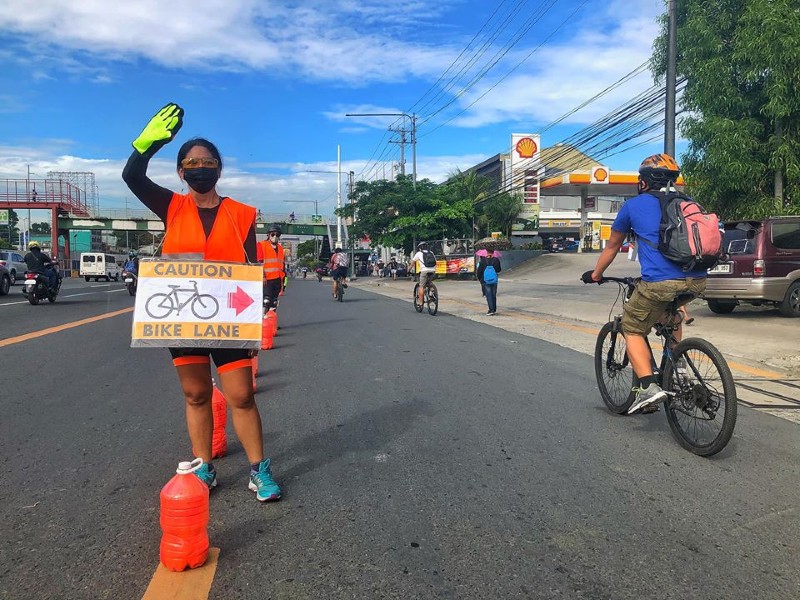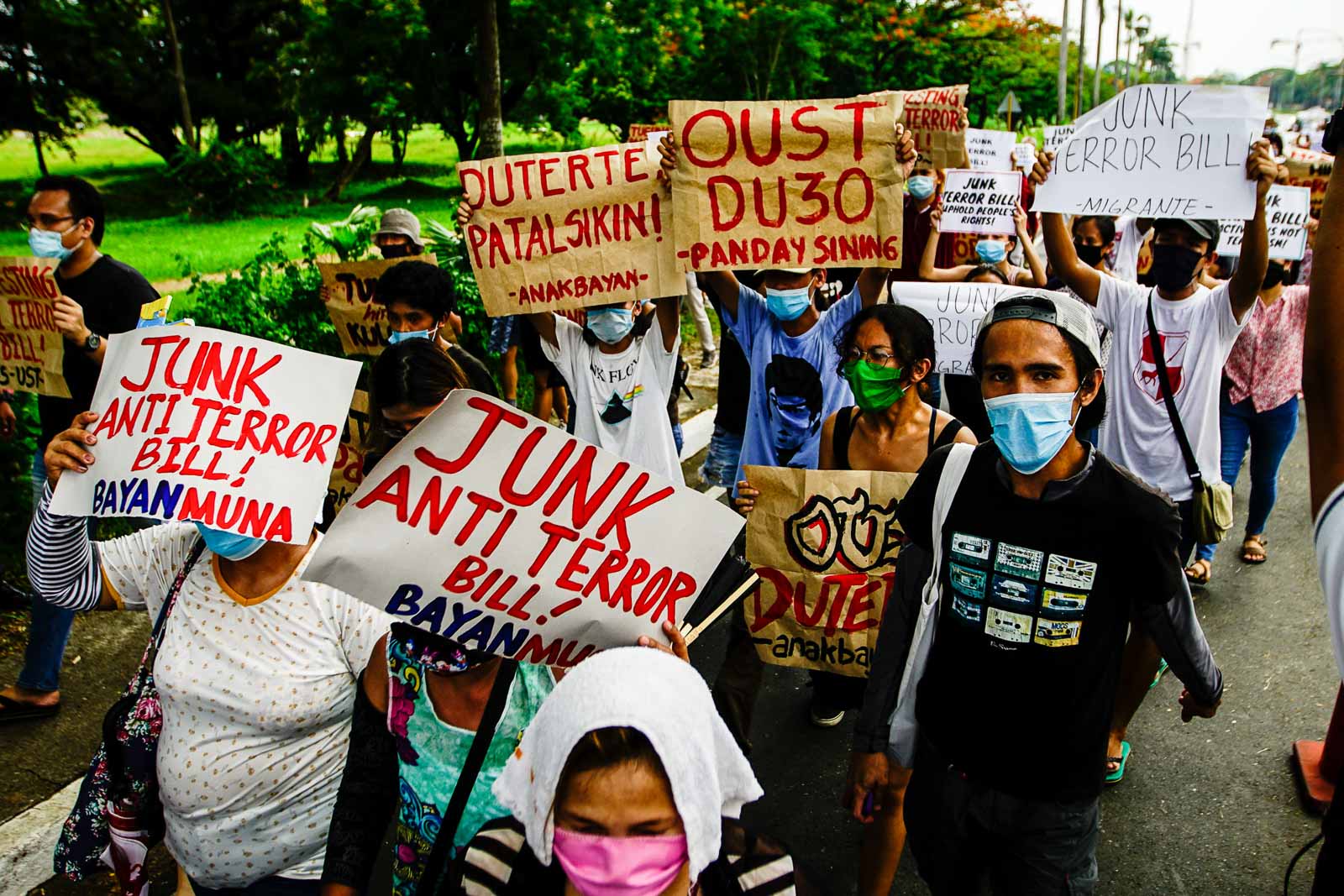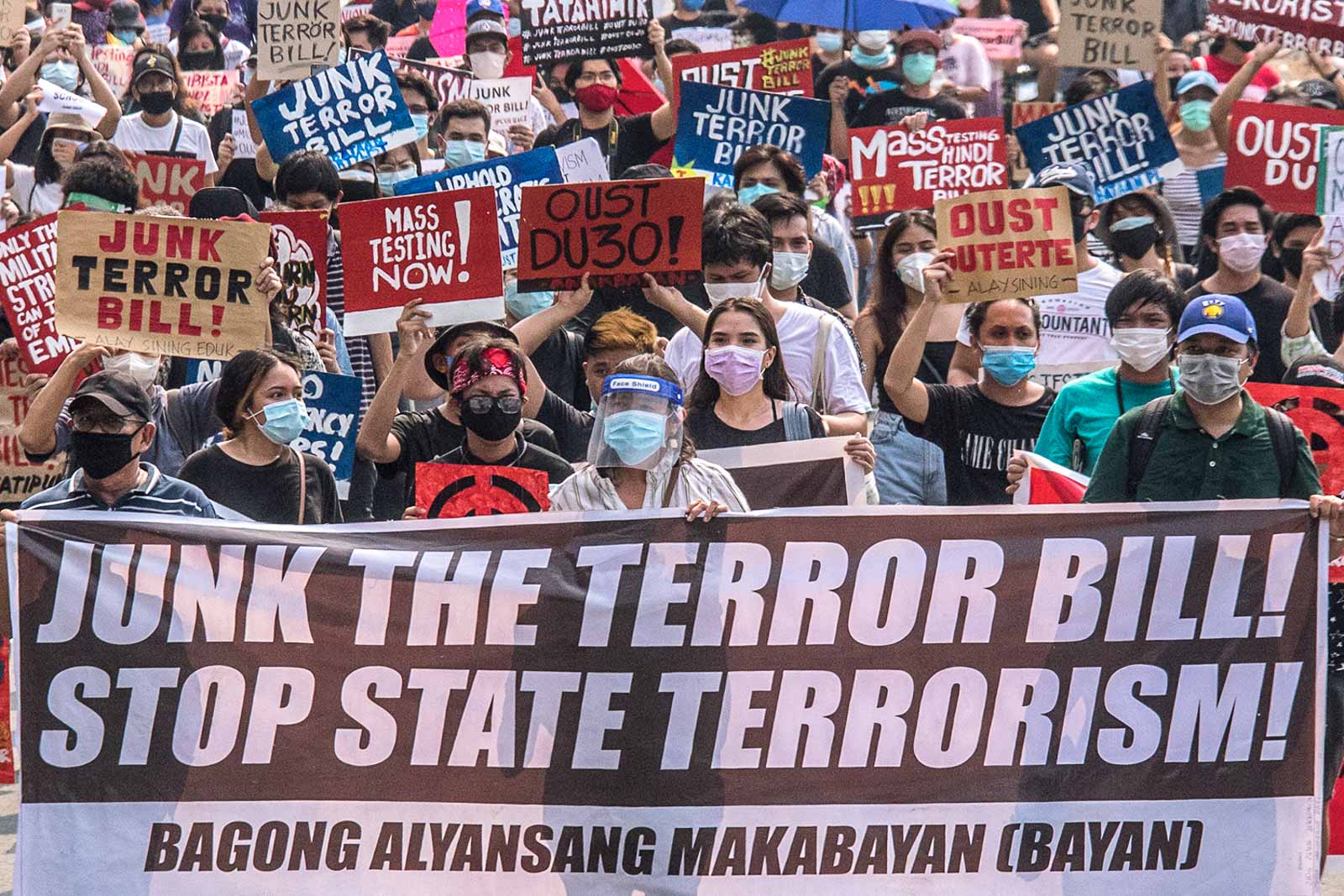![PROTEST. Various sectors and progressive groups continue its call to junk the anti-terror bill in an indignation rally held at the University of the Philippines Diliman, Quezon City on Thursday, June 4. Photo by Darren Langit/Rappler]()
MANILA, Philippines – Several sectoral and progressive groups continued its call to junk the anti-terrorism bill through simultaneous indignation protests held nationwide on Thursday, June 4.
This came a day after the House of Representatives approved on 3rd and final reading the House Bill (HB) No. 6875, colloquially known as the anti-terror or anti-terrorism bill.
Groups including Kalipunan ng Damayang Mahihirap, Kilusang Mayo Uno, Migrante International, Kilusang Magbubukid ng Pilipinas, and Karapatan Alliance Philippines among others, gathered at the University of the Philippines Diliman campus in Quezon City.
The passage of the bill sparked outrage among groups and concerned citizens who noted that this would institutionalize President Rodrigo Duterte’s abuse of power.
Despite the consistent online uproar calling to abolish the bill, Alliance of Concerned Teachers (ACT) representative France Castro challenged the public officials who gave it a thumbs up.
![UNITED. Protesters gather inside the University of the Philippines campus on June 4, 2020, to protest the passage of the anti-terrorism bill or HB 6875 in congress on June 3. Photo by Angie de Silva/Rappler]()
“Hanggang ngayon po, although nanalo na sa third and final reading ang Anti-Terror Bill, nananawagan tayo sa mga kasama nating Kongresista na magisip-isip sa kanilang naging desisyon dahil obvious ang naging pagtutol ng mga tao dito,” Castro said.
(Even until now, although the anti-terrorism bill was approved on its 3rd and final reading, we call upon the public officials in the Congress to think through about their decisions because it’s obvious that the people were against it.)
An overwhelming 173 lawmakers voted in favor of the bill, while only 31 voted no. A total of 29 abstained from the vote.
Turning a blind eye
She also questioned railroading of the bill after it has been certified urgent by Duterte especially at a time when the country grappled with the coronavirus pandemic.
“Sa gitna ng pandemya, ginawang urgent ang anti-terror bill imbes na solusyong medikal (In the midst of a pandemic, the anti-terror bill was made urgent instead of medical solutions),” she continued.
![JUNK. Protester shows a creative signage calling to junk the anti-terror bill. Photo by Jire Carreon/Rappler]()
Since it was certified urgent, it no longer needs to go through bicameral conference hearings and can be sent to Malacañang for Duterte's signature.
Migrante International chairperson Joanna Concepcion urged the government to prioritize safety and security of Filipino migrant workers overseas.
“Libo-libo sa mga Overseas Filipino Workers (OFWs) natin ang nawalan ng trabaho at kita dahil sa pandemya. Ngunit ang tugon ng gobyerno ay ipiit sila sa mga mala-kulungang quarantine facility kung saan marami ang nagugutom at binawian ng buhay.” Concepcion said.
(Thousands of OFWS have lost their jobs and income because of the pandemic. But the government's response involves forcing them into prison-like quarantine facilities where a lot of them went hungry and died.)
![ACTIVISM IS NOT TERRORISM. Protester raises a creative placard on Thursday, June 4 to rally against the passing of the anti-terrorism bill. Photo from the College Editors' Guild of the Philippines]()
Multi-sectoral group Bagong Alyansang Makabayan (Bayan) Secretary General Renato Reyes expressed that even if the government turned a blind eye to the plea of its people, sectoral groups will continue to unite in a bid to uphold their rights.
“Walang makapagpapapigil sa pagkilos ng mga tao oras na sinusupil sila. Kahit natalo tayo sa Kongreso at sa Korte Suprema, sa kalsada tayo lalaban. Hindi nagtatapos sa kanilang boto ang ating kapalaran, para sa ating karapatan at kalayaan,” Reyes said.
(No one could stop the movements of the people they are trying to control. Even if we lost the support of those at the Congress and probably in the Supreme Court, we will fight on the streets. Our fate doesn’t end with their votes. This is for our rights and freedom.)
![MOVEMENT. Various sectoral groups gather at the Quezon Hall in UP Diliman on Thursday, June 4, to call for the junking of the anti-terror bill. Photo from Philippine Collegian]()
Worried about implications
Through the anti-terrorism bill, a council of top cabinet officials will be able to do functions usually reserved for the courts, such as warrantless arrests and detention of people and groups perceived to be terrorists.
“Sa ilalim ng Anti-terror bill na ito, maaring i-surveillance ang mga aktibista man o ang ordinaryong mamamayan. Bawal na po ang pagtitipong tulad na ito (Under this bill, activists or ordinary citizens may be put under surveillance. Gatherings like this will not be allowed),” labor group Kilusang Mayo Uno (KMU) Secretary General Jerome Adonis said.
![RALLY. Students from Polytechnic University of the Philippines and members of progressive sectoral groups join the indignation protest at UP Diliman on Thursday, June 4 to condemn the passage of the anti-terror bill. Photo from Polytechnic University of the Philippines' The Catalyst]()
"Kaming magsasaka ang frontliner sa kanayunan, nagsisigurong sapat ang kinakain ng bansa habang may pandemya. Kaya hindi natin maisip ang kalalagyan ng mamamayan kung walang produksyon dahil pinapangalanan kaming mga terorista," Kilusang Magbubukid ng Pilipinas Secretary General Tonying Flores said.
(We farmers are the frontliners in the countryside, we ensure that food supply is enough during the pandemic. We can't imagine how the people will get by if food production stops because we have been tagged as terrorists)
Flores added that under the Duterte administration, 257 farmers have already been killed.
"Kami ay hindi mga terorista kung hindi mga aktibistang gusto ng tunay na reporma sa agraryo (We are not terrorists but activists who demand for true agriculture reform ," he continued.
![CALL TO JUNK. Students from UP Los Baños stage an indignation rally along Lopez Ave., Los Baños, to register their calls in junking the Anti-Terrorism Bill on Thursday, June 4. They also called out the government on their inaction towards the pandemic. Photo by Dianne Sanchez/ UPLB Perspective]()
Students of UP Los Baños marched to Agapita St. seconded this as it also held a simultaneous protest calling to junk the anti-terror bill, which threatens the freedom of student activists and critics to express dissent.
“Ginamit nila ang pandemya para tuluyang siraan ang ABS-CBN at patuloy na kitilin ang press freedom. Kagaya ng diktador na si Marcos, pinapasara nila ngayon ang mga media outlets na nagpapalaganap ng kanilang mga pagkukulang,” a representative from University of the Philippines Los Baños (UPLB) said.
(The government used the pandemic to shutdown ABS-CBN and to kill press freedom. Just like the late dictator Ferdinand Marcos, they also want to close media outlets amplifying the government’s inadequacies.)
While the bill is packaged to strengthen systems to fight and catch terrorists, Defend UPLB, an alliance of UPB student groups warned that it could be used to stifle government critics.
“Halos 3 na buwan na pero hanggang ngayon wala pa ring ayuda, mass testing, kongkretong aksyon para proteksyunan ang ating mga karapatan (It’s almost 3 months since the government implemented lockdown in various cities and provinces and yet there is no assistance, mass testing, concrete action to protect everyone’s rights),” it added.
Continuing the fight
Meanwhile, Akbayan Youth organized a virtual rally with representatives from various youth organizations across the country joined by human right lawyer Chel Diokno.
![VIRTUAL PROTEST. Representatives from various youth groups nationwide join the online protest led by Akbayan Youth on Thursday, June 4 to show their indignation towards the passage of the Anti-Terrorism Act of 2020. Screenshot from Akbayan Youth's Facebook livestream]()
For Diokno, the country has longed experience acts of terrorism since 2016 such as the extra-judicial killings (EJK) and use of warantless arrest to ordinary citizens.
“Nakakalungkot na yung mismong nagsusulong ng anti-terrorism bill ay sila rin pala ang gumagamit ng iba't ibang klase na pagterrorize sa ating bayan mula sa EJK at sa ibang mga paninikil sa atin kaparapatang pantao,” he said.
(It is sad that those who are pushing for the anti-terrorism bill are also those who use different ways to terrorize our nation through EJK and other measures to attack human rights.)
“It's really not a question of numbers. It's really a question of principle. It's a question of what we believe in and it's a question of our convictions,” he added.
Diokno also expressed his support and commended the youth for their response to fight back.
“This is the time for us to get together. This is the time for us to unite. This is the time for us to stand as one in opposition not only to the anti-terror bill but to all measures that are anti-people, to all measures that are designed to destroy our democracy,” Diokno stressed. – with reports from UPLB Perspective, Philippine Collegian, The GUIDON and The Catalyst/Rappler.com
![]()









































